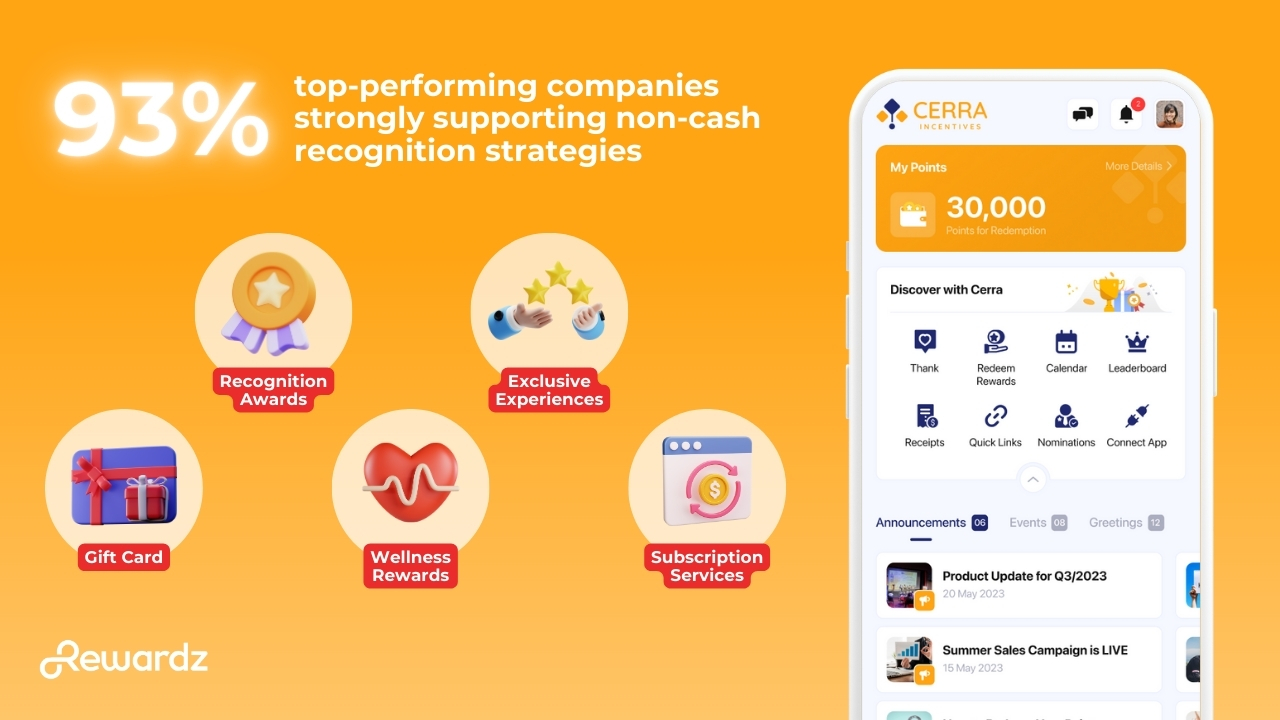Sales incentive programmes are structured reward systems designed to motivate individuals or organisations to achieve specific sales targets and behaviours. These programmes extend beyond simple commission structures, encompassing a comprehensive approach to driving performance through carefully crafted rewards and recognition.
This comprehensive guide presents 27 proven incentive programme ideas spanning monetary rewards, non-monetary recognition, team-based initiatives, and creative approaches that will transform your sales performance and partner relationships.
Building Motivation That Delivers Results
Creating effective incentive programmes requires a deep understanding of what truly motivates different audiences. The foundation of any successful programme begins with recognising that sales teams and channel partners often have distinctly different drivers and priorities. Research reinforces this point: the Incentive Research Foundation reports that executive leaders in top-performing companies are 35% more likely to champion reward programmes as vital performance tools, with 93% strongly supporting non-cash recognition strategies.
Understanding What Drives Performance
Sales teams typically respond to career growth opportunities, public recognition, and monetary rewards that reflect their individual contributions. These internal motivators centre around personal advancement and acknowledgement within the organisational structure. Channel partners, however, operate in a different environment entirely. They’re often more motivated by margin growth opportunities, exclusive access to products or territories, and brand alignment that enhances their competitive market position.
This distinction shapes how you approach programme design. Whilst an employee might value a promotion pathway, a channel partner is more likely to appreciate exclusive territory rights or enhanced discount structures that directly impact their business profitability.
Creating Transparent and Achievable Goals
Understanding these motivational differences leads naturally to the importance of goal setting. Transparency forms the foundation of any successful programme, as participants need absolute clarity about expectations and reward mechanisms. Goals must be clearly defined, measurable, and genuinely achievable within the given timeframe and market conditions.
This transparency becomes particularly vital when managing channel partners who operate independently from your daily operations. Unlike internal teams who receive regular guidance and feedback, partners rely heavily on clear programme documentation and consistent communication to understand how they can succeed.
Balancing Immediate Impact with Long-term Commitment
Once clear goals are established, successful programmes must carefully balance short-term motivation with long-term engagement. Quick wins maintain momentum and excitement throughout reporting periods, preventing participants from losing interest between major milestones. These immediate rewards create positive reinforcement that encourages continued participation.
However, longer-term incentives serve an equally important purpose by building sustained commitment and loyalty. Consider implementing tiered systems that provide immediate gratification for smaller achievements whilst simultaneously building towards substantial rewards for major milestones. This dual approach keeps participants engaged across different timeframes whilst supporting your strategic objectives.
Recognising the Complete Performance Picture
This balanced approach to timing naturally extends into how you recognise achievement. Rather than focusing solely on final sales outcomes, effective programmes recognise the behaviours and efforts that drive pipeline growth and customer satisfaction. This comprehensive recognition strategy encourages consistent performance throughout the sales cycle rather than sporadic bursts of activity.
For channel partners, this might include rewarding training completion, lead generation activities, or customer satisfaction metrics alongside traditional sales figures. Such recognition builds capabilities that benefit both parties over the long term whilst acknowledging the full spectrum of partnership value.
Maintaining Clear Communication Channels
Finally, all these programme elements depend on maintaining strong communication, particularly when managing external partners who aren’t part of your daily operations. Regular updates, clear programme explanations, and accessible progress tracking help maintain engagement whilst preventing confusion that could undermine programme effectiveness. This communication foundation ensures that even the best-designed programmes deliver their intended results through consistent participant understanding and engagement.
27 Proven Incentive Programme Ideas

Monetary Sales Incentive Programmes
- Commission-Based Incentives Enhanced commission structures reward top performers with higher rates once they exceed baseline targets. For channel partners, this might include accelerated commissions or rebates based on volume thresholds, creating clear financial incentives for increased sales activity.
- Tiered Bonuses Progressive bonus systems provide increasing rewards at each performance level. Internal teams might earn bonuses at 80%, 100%, and 120% of target, whilst partners could receive additional margin points or cash bonuses for reaching successive sales milestones.
- Spot Bonuses Immediate rewards for exceptional performance or specific achievements keep motivation high throughout reporting periods. These unexpected bonuses recognise outstanding efforts in real-time, whether it’s closing a difficult deal or successfully launching a new product line.
- Profit-Sharing or Margin-Boosting Incentives Sharing success through profit participation aligns interests between your organisation and participants. Channel partners might receive additional margin points on high-value deals, whilst internal teams could participate in departmental profit-sharing based on collective performance.
- Sales Contests with Cash Prizes Time-limited competitions create urgency and excitement around specific objectives. Monthly or quarterly contests with substantial cash prizes can drive focus on particular products, customer segments, or strategic initiatives.
- Gift Cards Flexible reward options allow recipients to choose their preferred treats. High-value gift cards for popular retailers or experience providers offer immediate gratification whilst giving participants control over their rewards.
- Paid Time Off / Additional Discounts For employees, extra holiday days provide valuable work-life balance benefits. Channel partners might receive enhanced discount structures or exclusive pricing tiers that improve their competitive position and profitability.
Also read: 13 Effective Sales Strategies for Sustainable Growth
Non-Monetary Individual Incentives
- Recognition Awards Certificates, trophies, and digital badges provide lasting acknowledgement of achievement. Partner portals can display earned badges and certifications, whilst employees might receive prestigious awards presented at company gatherings.
The IRF report shows that top performing companies are 20-30% more likely than their peers to view non-cash rewards and recognition as effective tools for recruiting, retaining, and engaging talent, as well as influencing desired behaviors.
- Personalised Gifts Thoughtfully selected items tailored to individual preferences create memorable experiences. High-quality branded merchandise, personalised items, or gifts that reflect personal interests demonstrate genuine appreciation for contributions.
- Learning & Development Opportunities Professional growth through specialised training, industry certifications, or skill development programmes benefits both the individual and your organisation. Partners might access exclusive marketing workshops or sales training, whilst employees could attend leadership development courses.
- Career & Business Growth Incentives Clear pathways to advancement motivate long-term commitment. Internal teams might earn fast-track opportunities for promotion or leadership roles, whilst partners could receive expanded territory rights or preferred vendor status.
- Exclusive Experiences VIP access to industry events, private dinners with executives, or behind-the-scenes experiences create unique value that money cannot easily replicate. These experiences often generate lasting memories and strengthen relationships.
- Office or Business Perks Practical improvements to working conditions show ongoing appreciation. Employees might receive equipment upgrades or premium workspace amenities, whilst partners could access marketing support packages or priority technical assistance.
- Wellness Rewards Health and lifestyle benefits demonstrate care for overall well-being. Gym memberships, wellness programmes, or health screenings for employees, and similar lifestyle benefits for partner personnel, contribute to long-term satisfaction and loyalty.
Team & Partner-Based Incentives
- Team Bonuses Collective rewards encourage collaboration and mutual support. When entire teams or partner networks achieve shared objectives, group bonuses distribute success fairly whilst reinforcing the value of working together.
- Team or Partner Outings Shared experiences build relationships and celebrate collective achievements. Team dinners, partner conferences, or group retreats provide opportunities for networking, relationship building, and informal learning.
- Office or Partner Celebrations Milestone parties and recognition events create positive associations with achievement. Celebrating major wins with organised gatherings reinforces the value of success and provides public recognition opportunities.
- Cross-Department or Co-Partner Collaboration Rewards Incentivising cooperation between different groups breaks down silos and encourages knowledge sharing. Sales and marketing collaboration rewards, or joint initiatives between different partner types, can drive innovation and mutual success.
- Leaderboard Recognition Gamified ranking systems create healthy competition whilst providing ongoing performance visibility. Digital dashboards showing team or partner standings can motivate consistent effort throughout reporting periods.
- Charity Donations Making donations to chosen charities in the name of high performers adds meaningful purpose to recognition. This approach appeals to those motivated by making positive contributions beyond pure commercial success.
- Flexible Work or Business Benefits Enhanced flexibility as a reward acknowledges the importance of work-life balance. Remote work opportunities for employees or priority support for partners provide practical benefits that improve daily operations.
Also read: Channel Marketing 101: Boost Your Sales with Partners
Creative & Unique Sales Incentives
- Travel Incentives Destination rewards create aspirational goals that drive sustained effort. Whether it’s weekend retreats, international conferences, or luxury holidays, travel incentives provide experiences that participants will remember long after the trip ends.
- Subscription Services Ongoing rewards through professional tools, lifestyle subscriptions, or software credits provide continuous value. Monthly deliveries or service access maintains engagement between major reward events.
- Experience-Based Rewards Adventure activities, workshops, or unique experiences offer alternatives to traditional monetary rewards. These might include cooking classes, outdoor adventures, or exclusive access to cultural events.
- Gamification Programmes Points-based systems with redemption options create ongoing engagement through game-like mechanics. Partner portals with points accumulation and reward catalogues make participation interactive and enjoyable.
- Custom Merchandise Premium branded items that participants actually want to use help maintain brand visibility whilst providing practical value. High-quality items that reflect achievement levels can become status symbols within your network.
- “CEO for a Day” or Leadership Access Executive access through lunch meetings, advisory council participation, or strategic planning involvement provides unique insights and recognition. These opportunities appeal particularly to ambitious individuals seeking growth and influence.
Best Practices for Implementation Success
Successful incentive programmes don’t happen by accident. They require careful planning, thoughtful execution, and ongoing attention to detail. The difference between programmes that drive real results and those that fade into irrelevance lies in how well they’re implemented and maintained over time.
Aligning with Strategic Objectives
Every successful incentive programme begins with clear alignment to both company objectives and participant motivations. Your programme structure should directly support strategic goals whilst providing meaningful value to participants, ensuring that improved programme performance translates seamlessly into broader business success.
This alignment becomes more complex when managing both internal teams and external partners simultaneously. Whilst your sales team might be motivated by career advancement opportunities, channel partners may prioritise business growth and competitive advantages that align with your market expansion strategy. Understanding these different needs allows you to create programmes that serve multiple strategic purposes without compromising effectiveness.
Tailoring Approaches for Different Audiences
This strategic foundation naturally leads to the importance of differentiating between internal and external participants. Sales employees operate within your organisational culture and respond to internal recognition systems and career development pathways. Channel partners, however, run independent businesses with their own priorities and success metrics.
Acknowledging these differences in programme design increases relevance and engagement. Internal teams might value public recognition and professional development opportunities, whilst partners may prefer business-focused rewards like enhanced margins or marketing support that directly impacts their bottom line.
Maintaining Transparency and Trust
Regardless of audience type, transparency in criteria and fairness in administration form the bedrock of sustained participation. Clear communication about earning criteria, reward mechanisms, and programme rules prevents confusion and ensures participants can make informed decisions about their efforts.
This transparency becomes particularly crucial during programme changes. When participants understand not only what’s expected but also why certain decisions are made, trust builds naturally. Regular communication about programme status and upcoming opportunities maintains engagement whilst demonstrating your commitment to the programme’s success.
Keeping Programmes Fresh and Relevant
Even the most thoughtfully designed programmes require regular review and refreshment to maintain effectiveness over time. What motivates participants today may become routine tomorrow, so evolving your offerings keeps programmes exciting and relevant to changing market conditions.
This evolution process should include gathering regular feedback from participants to identify areas for improvement. Understanding what’s working well allows you to make informed adjustments that improve programme performance whilst maintaining participant satisfaction.
Leveraging Technology for Efficiency
Modern digital platforms provide the technological foundation needed to streamline programme administration whilst offering real-time visibility into performance and rewards. Advanced features like automated transaction validation through OCR technology ensure programme integrity whilst simplifying participation.
For organisations seeking sophisticated channel incentives programmes, CERRA Incentives offers the comprehensive platform needed for success. The system’s OCR feature validates transactions automatically, whilst partners earn points based on their sales performance. These points can then be redeemed for their preferred rewards from a flexible catalogue, giving partners freedom to choose incentives that truly motivate them whilst ensuring maximum engagement across diverse partner networks.
Driving Success Through Strategic Incentives
Well-designed sales incentive programmes create powerful momentum that benefits everyone involved. By understanding what motivates different audiences and implementing programmes that align with business objectives, you can drive significant improvements in sales performance whilst building stronger relationships with both internal teams and external partners.
The key to long-term success lies in choosing the right combination of incentives, maintaining programme freshness through regular updates, and ensuring transparent, fair administration that builds trust and sustained engagement.
For organisations looking to implement sophisticated channel partner incentive programmes, modern platform solutions offer the technology foundation needed for success. CERRA Incentives provides the digital infrastructure to manage complex partner networks, with features like OCR transaction validation and flexible points-based reward systems that make programme participation straightforward for partners whilst ensuring accuracy for administrators.
The flexibility to offer diverse reward options gives you many possibilities, from cash bonuses to experience rewards. This means you can create programmes that truly resonate with your specific partner audience, driving the performance improvements that matter most to your business.
Ready to transform your sales incentive approach? Get in touch with us to discover how the right platform can amplify your programme success.



